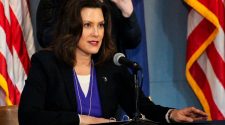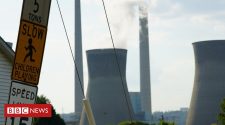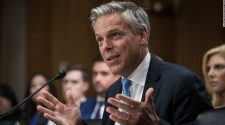President Donald Trump on Tuesday said that he was delaying some tariffs on Chinese imports ahead of the Christmas season to stem their potential impact on holiday shopping.
The Trump administration announced hours earlier that it would delay until Dec. 15 some of the tariffs that were originally scheduled to come into effect on Sept. 1.
“We’re doing this for the Christmas season,” Trump told reporters on an airport tarmac around noon Tuesday. “Just in case some of the tariffs would have an impact on U.S. customers.”
“But so far they’ve had virtually none,” the president added. “But just in case they might have an impact on people, what we’ve done is we’ve delayed it, so that they won’t be relevant to the Christmas shopping season.”
The acknowledgement that tariffs could harm holiday sales marks a shift for Trump, a self-described “tariff man” who has long claimed that the taxes on imports help the U.S. while applying pressure on China.
The U.S. trade representative said the delay would apply to a wide variety of goods, including certain electronics such as cellphones, laptops and video games.
A slew of Christmas-related products also appeared on the delay list. They include decorations for “Christmas festivities, nativity scenes and figures thereof,” Christmas tree lights and ornaments.
No other items for specific holidays appear to be included in the delay list.
President-elect Donald Trump speaks at the USA Thank You Tour 2016 at the Wisconsin State Fair Exposition Center December 13, 2016, in West Allis, Wisconsin.
Don Emmert | AFP | Getty Images
Trump had announced in early August that he would slap 10% tariffs on the remaining $300 billion worth of Chinese goods that had so far avoided import duties. The White House has already imposed tariffs on $250 billion worth of imports from China.
China had already slapped retaliatory tariffs on $110 billion worth of U.S. imports; they responded to the most recent tariff threat by canceling all purchases of U.S. agriculture products.
The White House’s move to back off on the hard-and-fast date for the new tariffs came as a sigh of relief for markets, which have been increasingly on edge amid the intensifying trade war between Beijing and Washington. Major indexes, which had been trading in the red before market open, shot up on the news.
Rising shares of tech companies, tech distributors and other retailers carried the market higher. Apple shares traded nearly 5% higher on the news and Best Buy soared more than 8%. Chipstocks also moved out of correction territory with the Semiconductor ETF down 8% from its July high.
Trump has long voiced full-throated support for tariffs. He regularly claims that China, not the U.S., bears the burden of the duties, and says that the U.S. is taking in “billions” from China.
Most economists are quick to point out that U.S. importers are the ones who directly pay the taxes, though tariffs can hurt China by making their goods more expensive for Americans to buy.
Trump’s comments Tuesday came just before traveling from his New Jersey golf resort to the Shell Pennsylvania Petrochemicals Complex, where he will deliver remarks about U.S. energy and manufacturing.















